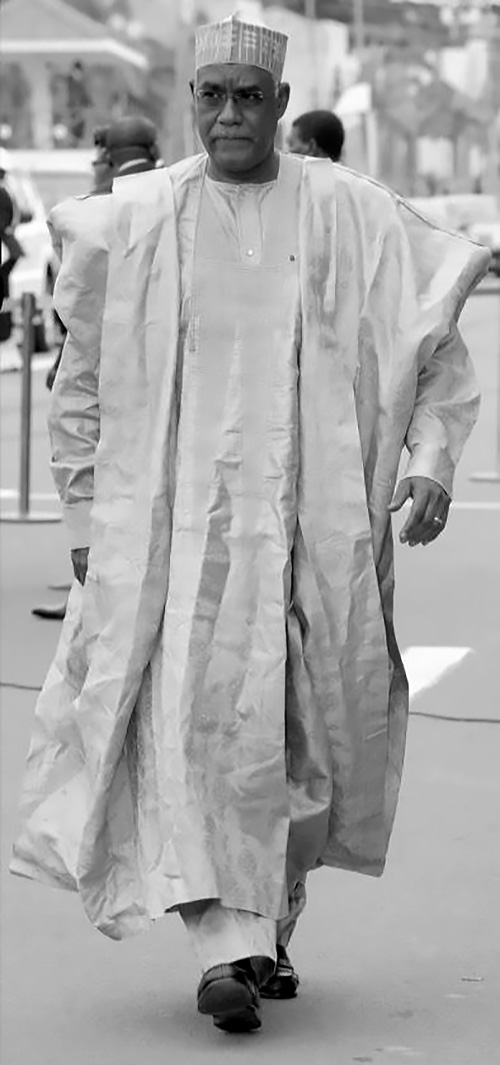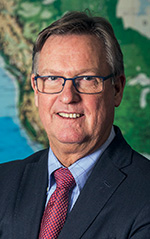WikiLeaks Damage Lives On: The Case of Marafa Hamidou Yaya
Speaking Out
BY NIELS MARQUARDT

Marafa Hamidou Yaya.
postwatchmagazine.com
The U.K. government decision in June to extradite WikiLeaks founder Julian Assange to the United States to face prosecution for crimes related to the release in 2010 of hundreds of thousands of stolen confidential U.S. government documents brings him one step closer to justice. No doubt he will appeal that decision, but I deeply hope that he will lose again and soon find himself facing justice before an American court.
Only then will the world see and, perhaps, fully understand the enormous damage his crimes inflicted on innocent friends and allies around the globe. This may also give the lie to the remarkably widely held fiction that Assange’s crimes had no victims and that his actions were somehow brave, harmless, or even worthy of admiration.
It is high time to start pushing back forcefully on the deeply mistaken notion that actions by Assange, perceived by many to be a sort of modern-day Robin Hood, advanced press freedom or brought welcome transparency to the workings of government. They did not. Instead, they illegally undermined the necessarily confidential basis of information sharing that makes diplomacy possible and advances America’s global interests in the process.
I write this column as a retired American diplomat whose normal embassy reporting, like that of many colleagues, was compromised by Assange’s indiscriminate release of that infamous cache of stolen documents more than a decade ago. No one seems able to say how many people, including many of America’s close friends, were damaged worldwide by the WikiLeaks release.
But I know well of at least one case, where a good man has now spent more than a decade in prison for alleged crimes never proven in court. This happened in Cameroon, where I served as U.S. ambassador from 2004 to 2007.
There, shortly after the WikiLeaks release, Kansas University graduate Marafa Hamidou Yaya was jailed and subjected to a short “kangaroo court” proceeding that resulted in a 25-year prison sentence on entirely unproven corruption charges.
Arbitrary Detention
Before his arrest, Mr. Marafa had served in various high-level ministerial positions in Cameroon, including as secretary-general of the presidency, arguably the nation’s second-most powerful post. Our embassy, then led by Ambassador Robert Jackson, witnessed his trial and denounced it as the farce it was; no evidence was presented, yet he was found guilty on all charges.
Since then, the State Department’s annual Human Rights Report to Congress has listed Mr. Marafa as a political prisoner in Cameroon. He is jailed in a military prison in a damp cell with no daylight. After his arrest, his loyal secretary of 20 years was savagely assassinated in her home, and his wife died without having a chance to visit her husband even once.
The United Nations has formally declared Mr. Marafa’s detention arbitrary and demanded his immediate release and compensation for the damages he has suffered. He has petitioned repeatedly for his own release on health-related grounds, and many outsiders have also weighed in on his behalf.
I and seven other former U.S. ambassadors to Cameroon have written to successive U.S. administrations for assistance in seeking Mr. Marafa’s release, so far without effect. Ambassadors (ret.) Frances Cook, Harriet Isom, Charles Twining, John Yates, George Staples, Janet Garvey, and Robert Jackson all know and respect him and have joined me in formally demanding his release. The Biden administration is fully aware of this situation but, to my knowledge, has not taken any strong action to secure Mr. Marafa’s release.
Because Mr. Marafa’s health has deteriorated significantly during his decade-plus in prison, the case for his release is ever more urgent. Now in old age, he survived COVID-19 (unvaccinated) while in detention last year. He has gone almost completely blind, suffers from a serious heart condition, and desperately needs medical treatment unavailable in Cameroon.
The United Nations Human Rights Committee has written many times lately, requesting the government of Cameroon “to provide Mr. Marafa with immediate access to the adequate and specialised medical care that may be required to preserve his sight.” So far, this call has not been heeded. Mr. Marafa has repeatedly said that he would be willing to go into exile abroad to obtain that treatment, implicitly abandoning any future political role at home.
Power Politics
While Mr. Marafa was accused of corruption, his only real crime was having told me, in confidence in 2006, that he “might be interested” in seeking Cameroon’s presidency one day, if ever the incumbent president, Paul Biya, were to leave office. My political section, then ably headed by current Ottawa Deputy Chief of Mission Katherine Brucker, naturally reported his comment in a periodic piece speculating on succession scenarios in a post-Biya era.
Once that cable to Washington was released by WikiLeaks in 2010, Mr. Marafa’s revelation immediately became frontpage news in Cameroon. This led directly to his arrest, and then to a classic “show trial” the following year. In Cameroon, where the near-nonagenarian Biya just marked 40 years in power, the whole succession question is sensitive enough that Mr. Marafa’s otherwise unremarkable comment about possible higher political ambition deeply rattled the country’s delicate tribal and political balance.
Evidently, Biya’s coterie of mostly southern, Christian supporters from the Beti tribe felt sufficiently threatened by the prospect of Mr. Marafa becoming president that they decided to sideline him permanently, and manipulated the country’s judicial system to do just that.
Mr. Marafa is a northern Muslim, like the country’s only other president since independence, Ahmadou Ahidjo. After 40 years of political advantage under Biya, little bothers privileged southerners more than the thought of a northerner regaining power.
WikiLeaks happened on the Obama-Biden administration’s watch. Many officials in the current administration were serving in senior government positions at the time and remain well aware of Mr. Marafa’s unjust incarceration. Thus, they should not need reminding of our government’s enduring responsibility to protect those harmed by this massive failure to protect confidences shared with us in good faith.
Nonetheless, they have not taken action; nor have they even shown the intellectual curiosity to seek to find out how many other “Marafas” are out there, across the globe. Indeed, when I invited the Bureau of Intelligence and Research (INR) to help gather the facts around this issue, they declined on the basis that WikiLeaks was “not an intel issue.”
Basic Decency at Stake
Speaking Out is the Journal’s opinion forum, a place for lively discussion of issues affecting the U.S. Foreign Service and American diplomacy. The views expressed are those of the author; their publication here does not imply endorsement by the American Foreign Service Association. Responses are welcome; send them to journal@afsa.org.
I continue to believe that basic American decency and a sense of loyalty and fair play compel us to pursue his case, and all others like it, until justice is truly served. Not only is it the right thing to do; it also would demonstrate to our friends and collaborators around the world—including many who were sufficiently shaken by WikiLeaks that they pointedly ceased even speaking to American diplomats—that, even after something as stupidly tragic as WikiLeaks is allowed to occur, America will live up to our responsibilities to friends affected by our mistakes.
Additionally, I fear that the United States is losing the global public opinion battle around WikiLeaks. With Assange’s impending extradition and prosecution, now is the time to launch a far stronger effort to explain why this case matters, and why we are taking it so seriously. Specious arguments positing that he is a legitimate journalist standing up for press freedom and transparency sadly resonate with far too many global citizens, few of whom have an inkling of the harm done to Marafa and others like him.
No doubt other friends who confided in the U.S. have met similar or worse fates; who is telling their stories? Absent an enhanced effort to explain why WikiLeaks matters, the U.S. will again appear in global public opinion to be nothing more than an overreaching bully.
But let me also ask: If the WikiLeaks theft and release of government secrets is worth extraditing Assange and pursuing in court over a decade later, shouldn’t we demonstrate some real concern for the actual victims of that crime, by taking action to address circumstances like Mr. Marafa’s?
Meanwhile, Paul Biya rules a wobbly Cameroon in senescence, incompetently repressing a bloody Anglophone secession campaign, watching Boko Haram stream largely unchecked across its borders, and continuing to preside over a well-endowed country that has performed far short of its extraordinary potential under his rule. No one knows what will happen when he finally leaves the scene, but widespread violence is considered by many of us to be a likely element of the coming transition.
What a missed opportunity that the competent, U.S.-educated Mr. Marafa is no longer among the possible solutions to Cameroon’s coming political drama. However, there is still the possibility of his being released for medical treatment in exile, and thus for him to live out his remaining days in dignity and freedom. We must press for this outcome, making clear that the American government stands by him and recognizes our direct responsibility for his current circumstances.
What You Can Do
Here are two things FSJ readers can do to help.
First, please write to your congressional representatives, especially if they sit on the Senate Foreign Relations Committee or House Foreign Affairs Committee, to demand action by the State Department and White House to secure Mr. Marafa’s release. A strong expression of congressional interest may help the State Department find the missing courage to take this on. (And please free to email me at nielsm@lclark.edu for a template message that can easily be pasted into an email to your senator.)
Second, if any reader has knowledge of other friends of the United States who were negatively affected by WikiLeaks and need our government’s attention, please email me that information. I will then share it with State’s Bureau of Intelligence and Research (INR), which I believe is the appropriate place in our government to compile comprehensive information on the full impact of WikiLeaks. I would hope that this information may then be used by others to strengthen a public affairs strategy to explain why prosecuting Assange is so important.
In my opinion, our government’s approach to WikiLeaks over successive administrations has been myopic and inadequate, and our failure to vigorously stand up for its victims for the past decade has bordered on shameful.
It is not too late, however, for us to do far better. For that to happen, more of us need to speak up and demand better. Please help do so.
Read More...
- “UK approves WikiLeaks founder Julian Assange’s extradition to U.S.,” by Karen Gilchrist, CNBC, June 2022
- “The Art of Political Reporting,” by Dan Lawton, The Foreign Service Journal, July-August 2014
- “Why They Stay In,” by Niels Marqaurdt, The Foreign Service Journal, April 2000
- “Why Worker Rights,” by Niels Marquardt, The Foreign Service Journal, February 1988




